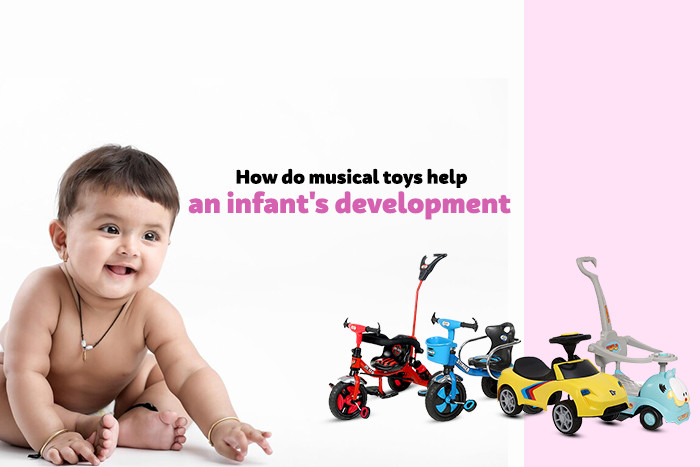How do musical toys help an infant's development?
Feb 21, 2024

Musical toys not only entertain kids but also help them develop different essentials. This includes early brain development, emotional development, and maintaining moods in different situations. Neurologists who study baby brain development agree that music contributes significantly to long-term development. In fact, you have sometimes used music to keep the baby engaged and calm so that, as a parent, you can focus on daily activities.
This blog highlights how musical toys help children develop necessary skills in the early stages of development.
Music & Infant’s Development: How Musical Toys Contribute to Growth
Here is how musical toys contribute to development in infants –
It develops communication skills:
Musical toys provide infants with a means of communication before they can articulate words. The sounds produced by these toys, whether it's the tinkling of a bell or the melody of a chime, help infants understand cause and effect relationships. This early understanding can lay the groundwork for more complex communication skills later in life.
It contributes to language & creativity development:
Exposure to music through toys can also contribute to language development in infants. The rhythmic patterns and repetitive nature of music can help infants recognize and remember sounds, which are essential building blocks for language acquisition. A study at the University of Southern California found that musical experience in childhood accelerates brain development in areas of language and reading. Additionally, music can spark creativity and imagination in infants, encouraging them to explore different sounds and melodies.
It encourages motor development:
Musical toys often require infants to engage in physical activity, such as shaking a rattle or banging on a drum. These actions help in developing fine and gross motor skills, as infants learn to coordinate their movements to produce the desired sounds. This physical interaction with musical toys is not only fun but also beneficial for their overall motor development.
It helps in cultivating social skills:
Musical play can also help infants develop social skills. When parents or caregivers engage with infants in musical activities, it creates a bonding experience. Furthermore, group musical activities, such as singing in a group or playing musical games, can help infants learn about cooperation and turn-taking, essential skills for social interactions. In fact, a recent study has shown that kids who engage in participatory group music and movement activities have developed better relationship and networking skills for social interaction.
It fosters active listening & learning:
Infants are naturally curious and attentive to sounds in their environment. Musical toys can help cultivate active listening skills in infants as they learn to differentiate between various sounds and tones. This ability to focus and listen attentively is a fundamental skill that can benefit them in their future learning endeavors.
It helps with emotional expression: Music has the power to evoke emotions, even in infants. Musical toys that produce soothing melodies can help calm a fussy baby or provide comfort in stressful situations. Research has found that music actually helps reduce emotional problems in kids, and if it is combined with play therapy, the impact gets more in depth. Additionally, music can also be used as a tool for parents to connect with their infants emotionally, creating a nurturing and supportive environment.
It helps kids keep calm:
The soothing nature of music can help infants relax and unwind. Soft lullabies or gentle melodies can create a calming effect, which is particularly helpful during bedtime or naptime routines. This ability of music to create a peaceful environment can contribute to better sleep patterns and overall well-being in infants. Musical toys also help to develop children's attention and release chemicals in the brain, such as dopamine. This ultimately encourages kids to spend more time with their toys.
Conclusion:
Music integrated into toys positively impacts various aspects of child development, including motor skills, language acquisition, social interaction, cognitive abilities, and academic performance. In fact, many studies have shown that music provides children with a means of self-expression, allowing them to express their emotions and feelings. Additionally, musical toys serve as a form of communication and can expose children to challenges and multi-sensory experiences, which can enhance their learning abilities and cognitive development.

